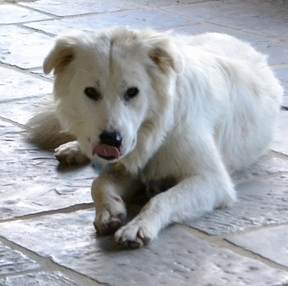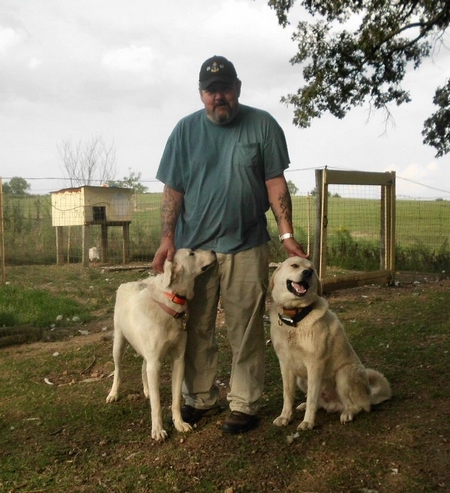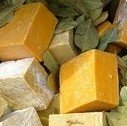Livestock Guardian Dogs: Myths, Behavior, Way of Thinking and Training
 Livestock guardian dogs are a must if you need
to protect your sheep, goats and poultry from predators.
Livestock guardian dogs are a must if you need
to protect your sheep, goats and poultry from predators. Over the last 6 months I have lost 2 chickens, 1 duck and 1 turkey to either foxes or weasels.
Last month, I got myself a maremanno livestock guardian puppy of 9 months old (pictured left, and called Bear) to protect both my current poultry and the sheep we are bringing onto the property in October.
Gypsy talks about her experiences of guardian dogs, especially the Akbash which she breeds and raises. This is her story:
Before Getting Livestock Guardian Dogs
As most of us who raise
livestock or poultry do, over the years we have had many different
types of predators. At times the predator load has almost wiped us out.
We have gone from over 200 head of poultry to less then 6. I have
witnessed lambs being eaten by coyotes as they are delivered from their
mother's womb.
Fox, coyote, cougar, and some wolf hybrids attack our sheep and goats, while coon, mink, fox, hawks and coyote seem to be the main killers of poultry, along with rats. The shear battle to simply raise livestock and poultry will make your brain explode.
After building the perfect poultry run, along with a nice shelter for my free range birds, I thought I had the problem licked. There was hot wire, every hole was patched, it was expensive, and it was perfect.
As I had just finished the last bit of this perfect fence, a hawk came down from the sky and took a half grown heritage Rhode Island red. It was about 2 inches from me. I cried. After hundreds of dollars and hours and hours of time, nothing I did was good enough.
Lost, feeling helpless, and although another dog really was not something I wanted, the thrifty nickel was the answer. There in the local exchange was my salvation. Just $50.00 and a 3 hour drive later we had Gabe.
It took 2yrs for her to grow up. For 2yrs we could not trust her with anything. She would play with the sheep, climb on top of the llama playing, and stacked up about 20 half grown turkeys under her favorite tree. It seems as if the teen years would never end. Then, one day, it all came together.
It was during a horrible thunderstorm that produced 2 tornadoes and golf ball-sized hail when Mya decided to grow up and become the livestock guardian dog she was meant to be.
Prey animals like birds and sheep will take cover and stay put during a storm, this means predators hunt during storms. The prey is easy to find and kill during this time. Something must have snapped in Mya. Gabe is getting old and doesn't do his job anymore.
Mya chewed through a fence and made kills in Gabe's area. After that she got the idea of what she was born for and she would hunt down predators. The problem was, she is only one dog. Her head was swollen, she was chewed up with puncture wounds. She was so exhausted that she slept for 24 hours after the big storm.
We then bought her a wolf collar. These are the spiked collars you see in photos normally for in dogs in nomadic areas. It was $50.00 well spent. She was less stressed. The first night she made 4 kills and was still hunting and bringing home predators after the sun came up. There wasn't a mark on her. She tripled her kill load with no injuries to her at all. The collar is now something all our dogs will wear.
Fox, coyote, cougar, and some wolf hybrids attack our sheep and goats, while coon, mink, fox, hawks and coyote seem to be the main killers of poultry, along with rats. The shear battle to simply raise livestock and poultry will make your brain explode.
After building the perfect poultry run, along with a nice shelter for my free range birds, I thought I had the problem licked. There was hot wire, every hole was patched, it was expensive, and it was perfect.
As I had just finished the last bit of this perfect fence, a hawk came down from the sky and took a half grown heritage Rhode Island red. It was about 2 inches from me. I cried. After hundreds of dollars and hours and hours of time, nothing I did was good enough.
Lost, feeling helpless, and although another dog really was not something I wanted, the thrifty nickel was the answer. There in the local exchange was my salvation. Just $50.00 and a 3 hour drive later we had Gabe.
Our Experience with Livestock Guardian Dogs Gabe and Mya
Gabe, our livestock guardian dog watched the sky so well sparrows couldn't land in the bushes. He killed skunks, and all the other things that seemed to keep me up at night. He worked out so well that a few years later we decided to buy a pure bred Akbash, paying good money and driving even further, lots further, Mya entered our family.It took 2yrs for her to grow up. For 2yrs we could not trust her with anything. She would play with the sheep, climb on top of the llama playing, and stacked up about 20 half grown turkeys under her favorite tree. It seems as if the teen years would never end. Then, one day, it all came together.
It was during a horrible thunderstorm that produced 2 tornadoes and golf ball-sized hail when Mya decided to grow up and become the livestock guardian dog she was meant to be.
Prey animals like birds and sheep will take cover and stay put during a storm, this means predators hunt during storms. The prey is easy to find and kill during this time. Something must have snapped in Mya. Gabe is getting old and doesn't do his job anymore.
Mya chewed through a fence and made kills in Gabe's area. After that she got the idea of what she was born for and she would hunt down predators. The problem was, she is only one dog. Her head was swollen, she was chewed up with puncture wounds. She was so exhausted that she slept for 24 hours after the big storm.
We then bought her a wolf collar. These are the spiked collars you see in photos normally for in dogs in nomadic areas. It was $50.00 well spent. She was less stressed. The first night she made 4 kills and was still hunting and bringing home predators after the sun came up. There wasn't a mark on her. She tripled her kill load with no injuries to her at all. The collar is now something all our dogs will wear.
Two of our Akbash Guardian
Livestock Dogs
Livestock Guardian Dog Myths
Livestock guardian dogs,
as you can tell, are a wonderful tool of the farm. At times, we could
not make it with out them. The largest issue with guardian dogs are the
myths surrounding them. Most people either don't understand that they
are not like all other breeds of dogs, or they have been told things
that simply are not true.
Myth 1: You cannot Make Friends with your Guardian Dog
The myths are far
reaching. The worst one is that you should not make
friends with your dog. If you do, he won't be any good. This is
absolutely not true. This myth came from the 1970s when livestock
guardian dogs were first
being imported and most didn't have an understanding of them or how
different they are to other breeds of dogs.
Now we know better but the old myth survives. It is best to make friends with, train, and bond with your dog. Our dogs come in the house for rest when they need it. They are potty trained so if they get sick, or when they get old, they can come in.
They are bred to hunt predators, this is what they do, so when they are well rested and we turn them back out they shoot off into the pasture to do their job. It's fun for them, they are not house dogs and have no will to be one. They do however enjoy the special food and a bit of rest at times. Making friends with your dog does not keep him from doing his job.
Now we know better but the old myth survives. It is best to make friends with, train, and bond with your dog. Our dogs come in the house for rest when they need it. They are potty trained so if they get sick, or when they get old, they can come in.
They are bred to hunt predators, this is what they do, so when they are well rested and we turn them back out they shoot off into the pasture to do their job. It's fun for them, they are not house dogs and have no will to be one. They do however enjoy the special food and a bit of rest at times. Making friends with your dog does not keep him from doing his job.
Myth 2: Livestock Guardian Dogs will Guard Anything
The other very hurtful
myth is that they will
guard anything. This is also not true. The hardest thing to get is a
dog that will guard poultry. Most dogs will kill poultry. They really
have to have a tendency for it. Our dog Gabe is very good with birds,
he has a genetic tendency for it. Mya, is ok with adults birds but will
kill the babies.
Their puppies are fairly good with birds even from a young age, they got that from their father. However some of the pups are like their mother and will kill the birds. You have to make sure the parents were good around birds and test a pup before bringing it home to guard poultry.
Their puppies are fairly good with birds even from a young age, they got that from their father. However some of the pups are like their mother and will kill the birds. You have to make sure the parents were good around birds and test a pup before bringing it home to guard poultry.
Myth3: All Livestock Guardian Dog Breeds are the Same
No, they are not.
Different breeds were developed in different countries, in different
climates and in different regions of those countries. All for different
needs. Some livestock guardian breeds will stay close to the livestock
while others will
rarely be around the livestock choosing to go out to the parameters and
catch predators before they can reach the flocks.
It is best to not only research how livestock guardian dogs (LGDs) are different from other breeds but also learn about each type of LGD before bringing your first one home.
There is a research facility near Yellowstone National Park in Wyoming that tests different guardian breeds to help ranchers and wolves live in harmony. The dogs will drive off the wolves protecting livestock and allowing wolves to continue to live in Yellowstone with out ranchers wiping them out. Some breeds have been found worthless as the wolves will kill them, some to the point that the wolves are hunting the dogs.
There is one breed in particular this is happening to. The same breed is also being killed by wolves reintroduced into France. This breed was famous years ago, but now after being removed from heavy predator loads for 70-80 years is no longer able to do the job it once did.
Guardian breeds that are showing a lot of promise are ones that have not been in the US very long and came from countries where they have been working for thousands of years. Turkish dogs are on the top of that list. This tells us that when you buy a puppy, buy it not from a farmer but from a farmer or rancher that is actually working their dogs with heavy predator loads. If the parents are not making a kill every week or so, the pups may not be effective.
It is best to not only research how livestock guardian dogs (LGDs) are different from other breeds but also learn about each type of LGD before bringing your first one home.
There is a research facility near Yellowstone National Park in Wyoming that tests different guardian breeds to help ranchers and wolves live in harmony. The dogs will drive off the wolves protecting livestock and allowing wolves to continue to live in Yellowstone with out ranchers wiping them out. Some breeds have been found worthless as the wolves will kill them, some to the point that the wolves are hunting the dogs.
There is one breed in particular this is happening to. The same breed is also being killed by wolves reintroduced into France. This breed was famous years ago, but now after being removed from heavy predator loads for 70-80 years is no longer able to do the job it once did.
Guardian breeds that are showing a lot of promise are ones that have not been in the US very long and came from countries where they have been working for thousands of years. Turkish dogs are on the top of that list. This tells us that when you buy a puppy, buy it not from a farmer but from a farmer or rancher that is actually working their dogs with heavy predator loads. If the parents are not making a kill every week or so, the pups may not be effective.
Myth 4: Sheep Dogs make good Livestock Guardian Dogs
Wrong! Herding dogs are dangerous with heavy prey drives. They should never be left alone with livestock. Crossing your herding dog with a livestock guardian dog will also produce dogs that will kill livestock. This is a dangerous trend and one people are soon learning is a trend that they should not continue.How Livestock Guardian Dogs Think
These dogs will bark
when people come to visit, however unlike other breeds of dogs they
will not bite. They, will only actually attack if there is a threat.
If a stray dog comes into their territory they will put on a great show, bear their teeth and act like they will kill it. However most will stop short when they reach the dog, and see if they are a threat if the dog was not impressed enough to leave when they saw the LGD coming.
If there is no threat, the LGD will most likely not mess with the dog, they will watch them, they may even escort them off the property, but they will not attack unless the dog poses a threat.
This is the same with human intruders. Most livestock guardian dogs however learn to enjoy killing wild predators and some will even hunt them. They know the difference between a domestic dog and a wild animal. They like everything in its place.
If a stray dog comes into their territory they will put on a great show, bear their teeth and act like they will kill it. However most will stop short when they reach the dog, and see if they are a threat if the dog was not impressed enough to leave when they saw the LGD coming.
If there is no threat, the LGD will most likely not mess with the dog, they will watch them, they may even escort them off the property, but they will not attack unless the dog poses a threat.
This is the same with human intruders. Most livestock guardian dogs however learn to enjoy killing wild predators and some will even hunt them. They know the difference between a domestic dog and a wild animal. They like everything in its place.
How to Train Livestock Guardian Dogs
You need to introduce
animals through a fence first, so that the dog
understands it belongs there. If you take away stock, they don't
normally get to upset, however can be depressed for a shot period if
you take away too many, or if you take an animal away that they have
bonded to.
It is best to train livestock guardian dogs with an older dog, so that they can go to work sooner. Puppies cannot be left on their own, even though they are very large, they are still puppies and need time to mature. The teen stage for most is horrible.
Everything they knew, they forget and you have to do it all over again. It's worth it, stick with it. Many times you hear of a 7 month old pup making kills. What you don't hear is that they were with an older dog when they did it. Most pups are not ready for that kind of pressure.
It is best to train livestock guardian dogs with an older dog, so that they can go to work sooner. Puppies cannot be left on their own, even though they are very large, they are still puppies and need time to mature. The teen stage for most is horrible.
Everything they knew, they forget and you have to do it all over again. It's worth it, stick with it. Many times you hear of a 7 month old pup making kills. What you don't hear is that they were with an older dog when they did it. Most pups are not ready for that kind of pressure.
I hope this has helped you to better trust and understand these awesome, gentle dogs.
By Gypsy, our resident homestead blogger from One Sky Ranch
Gypsy's Wanderings Homestead BlogDid you find this page helpful?
Sharing is a way of saying, "Thanks!"
Follow Us and Keep Up to Date
Don't miss out on our latest news and articles. Sign up for our free monthly e-zine!
Go from Livestock Guardian Dogs back to Homestead BlogGo back to the Home Page








New! Comments
Do you have something of value to add? Leave me a comment in the box below.